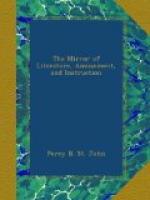It was early in 1828 when Paganini arrived at Vienna, where he gave a great many concerts with a success equal, if not superior, to any which had hitherto attended his exertions. His performance excited the admiration and astonishment of all the most distinguished professors and connoisseurs of this critical city. With any of the former all idea of competition was hopeless; and their greatest violinist, Mayseder, as soon as he had heard him, with an ingenuousness which did him honour, as we ourselves have reason to know, wrote to a friend in London, that he might now lock up his violin whenever he liked.
In estimating the labour which it must have cost a performer like Paganini to have arrived at such transcendent excellence, people are often apt to err in their calculations as to the actual extent of time and practice which has been devoted to its acquisition. That the perfect knowledge of the mechanique of the instrument which his performance exhibits, and his almost incredible skill and dexterity in its management must necessarily have been the result of severe discipline, is beyond all question; but more, much more, in every case of this kind, is to be ascribed to the system upon which that discipline has proceeded, and to the genius and enthusiasm of the artist. The miraculous powers of Paganini in the opinion of his auditors were not to be accounted for in the ordinary way. To them, it was plain that they must have sprung from a life of a much more settled and secluded cast than that of an itinerant Italian musical professor. It was equally clear, from his wild, haggard, and mysterious looks, that he was no ordinary personage, and had seen no common vicissitudes. The vaults of a dungeon accordingly were the local habitation which public rumour, in its love of the marvellous, seemed unanimously to assign to him, as the only place where “the mighty magic” of his bow could possibly have been acquired. Then, as to the delinquency which led to his incarceration, there were various accounts: some imputed it to his having been a captain of banditti; others, only a carbonaro; some to his having killed a man in a duel; but the more current and generally received story was, that he had stabbed or poisoned his wife, or, as some said, his mistress; although, as fame had ascribed to him no fewer than four mistresses, it was never very clearly made out which of his seraglio it was who had fallen the victim of his vengeance. The story not improbably might have arisen from his having been confounded with a contemporary violin-player of the name of Duranowski, a Pole, to whom in person he bore some resemblance, and who, for some offence or other having been imprisoned at Milan, during the leisure which his captivity afforded, had contrived greatly to improve himself in his art; and when once it was embodied into shape, the fiction naturally enough might have obtained the more credence, from the fact that two of his most distinguished predecessors,




